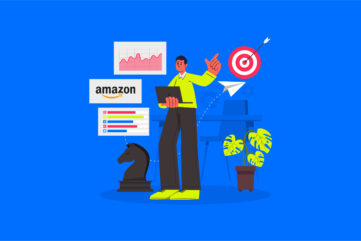Why brand positioning is important for your growth strategy

As branding experts, we still encounter numerous companies that don’t fully understand why brand positioning is important to their overall growth strategy.
Many organizations still assume they can succeed simply by making enough noise in their industry or choosing a competitive product price. However, the reality is brand positioning is crucial for any company.
Effective brand positioning may be more important today than ever before.
Why? Because the competition in every industry is increasing.
The rise of the internet has lowered the barrier to entry for new companies entering the landscape. This means consumers have a myriad of options to choose from in every sector. They’re no longer driven to choose organizations based on price or geographic location.
With 213 million companies actively operating worldwide, you’re guaranteed to fight for customer attention against a handful of other organizations. Brand positioning is convincing your target audience that you have the best solution for their problems.
Brand positioning not only gives you a competitive advantage when acquiring new customers. It improves your chances of capturing a space in your customers’ minds, ensuring they continue to purchase your products, even when new organizations compete for market share.
Let’s explore why brand positioning is essential to any brand strategy.
The importance of brand positioning: An introduction
To understand why brand positioning is important, it’s worth looking at the current marketplace and the competitors within it. There are likely to be at least a handful of companies you consider to be the “best” option in virtually any industry.
When you have a cold, you ask for a “Kleenex.” When you want to copy a document, you “Xerox” it. Even when you’re searching for solutions online, the chances are you’re more likely to “Google” your query than load up any other search engine.
Brand positioning is the reason these organizations have such a strong place in your mind. Each company has carefully built its marketing strategy around a brand positioning statement focused on targeting specific customers with a unique selling proposition.
Every company, no matter how big or small, has a “position” in its chosen marketplace. Even if you serve a particularly niche customer base, the clients you serve and the leads considering your brand already perceive you in a certain way based on your pricing points, brand image, and identity.
With an effective brand positioning strategy, you stop leaving your customer’s understanding of your business to chance. Instead, you take control of your reputation in your industry and double down on ensuring your target customers can understand your company’s offering, brand promise, and value.
With brand positioning, you get to decide exactly how your customers feel about your brand and how you cultivate that emotional response. You determine what people are going to think when they see or hear your brand name and how they’re going to compare you to the competition.
Brand positioning also enables you to leverage every part of your brand identity, from the packaging you use for your products to your chosen promotions and even your logo. You can craft a distinct position in your chosen landscape.
The result not only helps you to attract the right customers (the ones most likely to benefit from your brand), but it also ensures you can present yourself as the best choice for their needs.
Why is brand positioning important: 5 reasons
Successful brand positioning influences every part of your business strategy, from the core values you demonstrate in your marketing strategies to the way you interact with potential customers.
Choose the right position for your company, and you ensure you can consistently and effectively align your teams, connect with your target audience, and outshine the competition.
Let’s look at some of the main reasons why positioning is important.
1. Cultivating and controlling customer perception
First and foremost, brand positioning ensures you can choose the place you want to hold in your customers’ minds. Whatever your company does, or sells, will drive a response from your target audience.
Failing to cultivate a brand positioning strategy means you’re leaving the overall reputation of your company to chance.
While you can focus on things like creating an amazing product and delivering great customer service, and hoping for the best, there’s still a chance your customers might not see your company how it’s intended to be perceived.
A brand positioning strategy and statement allow you to define a successful brand identity and present it to your customers in the most compelling way possible.
Essentially, you can edit the way your customers perceive your brand without changing your product or service in any way. You can decide whether you want to be seen as the company with the cheapest product, the market leader in your sector, or the most reliable company on the market.
2. Ensuring consistency
Consistency is one of the most important things any company can strive for. Think of it this way. Would you be more likely to buy a product from a business that constantly showcases the same identity and values or one that appears to change its focus every other week?
Consistency breeds reliability, credibility, and trust. It shows your customers that you’re stable, focused, and committed to achieving specific goals.
However, as a company grows, it’s easy for consistency to begin to falter. As new team members enter your company and you begin to work on different marketing campaigns across a range of channels, your brand statement can become muddied.
Creating a strategic brand position statement ensures you can align your team around the same consistent vision and mission. When everyone you work with understands what your business stands for and what you’re trying to accomplish, the risk of inconsistencies is reduced.
3. Guiding brand asset development
Defining your brand’s position also helps to ensure you can build the right image for your brand. While there’s more to capturing the minds of customers than having an attractive logo or color palette, your image can make a significant difference to your chances of success.
The best visual brands aren’t developed simply on the basis of what’s popular or trending in the market at any given time.
They’re built on a strong foundation of brand identity. When you develop a brand position statement, your design and marketing team understands what you’re trying to convey with every visual asset you create.
Knowing your brand positioning strategy means you can adapt your visual marketing materials to ensure you’re separating yourself from the competition and resonating with your customers on the right level.
It ensures everything from your logo to your website design will earn you a distinctive place in the minds of customers.
4. Fostering market differentiation
When it comes to exploring the reasons why brand positioning is important, differentiation is a big factor. In every industry, you’ll have direct competition and indirect competitors to think about.
Even if you think you have the only product in your industry capable of delivering specific benefits, based on your market research, someone could come along and create something similar.
Understanding and promoting your market position helps you to remind your customers why they should consider your business as the best solution to their problems. It helps you preserve your leadership position, even as the competitors in your industry evolve.
When you create a brand positioning statement, you define what sets you apart from the other companies in your space using competitor analysis.
From there, you can consistently draw attention to your unique values and the specific benefits of your products, boosting your chances of standing out in your industry. You might decide to showcase your company as the main innovator in your space, or the most reliable source of customer support.
Whatever your differentiating factor is, it will help customers to compare you to the other vendors in your industry, and decide whether you’re right for their needs.
5. Justifying your pricing strategies
Even companies offering a crucial service, such as healthcare or nutrition, need to be able to justify why they’ve chosen a specific pricing strategy.
Customers need to understand why you’ve valued your products or services in a certain way, so they can determine whether your solution is worth their money. Brand positioning helps you to justify the price of your product.
It allows you to compare your solutions or services to those offered by the competition, so you can demonstrate why your solution might be more expensive than some of the cheaper solutions on the market. It also draws direct attention to the benefits or values you provide.
This means customers can answer the question of “why” they should buy from you.
A good branding strategy can even help you to gain customers when your products are a lot more expensive than the competition. For instance, just look at how luxury brands like Apple still encourage massive sales, by promising their customers a better experience than the competition.
Why positioning is important for business growth
We’ve already covered some of the main reasons why brand positioning is important. However, a good positioning strategy isn’t just valuable when you’re establishing your company. It’s also essential for ensuring your organization can continue to grow and thrive.
Let’s look at some of the reasons why positioning is important for business growth.
1. Building emotional connections
According to a Harvard professor, around 95% of our purchasing decisions are made based on emotional factors.
While we might like to think we buy different things based on logic, choosing products for their feature set, value, or price, the reality is that we’re all driven by how we feel about a company and the products it sells.
With a brand positioning strategy, you can cultivate that crucial emotional connection.
Developing a unique brand or product positioning statement involves looking not just at your competition but also at your core values as a company, your unique selling points, and the specific needs of your target audience.
This ensures you can build your brand around things that really matter to your clients.
Whether you convince your customers you’re more trustworthy than your competitors or that you deliver a more convenient product, you elicit an emotional response that boosts your chances of initial purchase and ongoing customer loyalty.
Studies have shown branding which evokes an emotional response can lead to a 23% increase in sales.
2. Strengthening brand recall
To generate success as a brand, you don’t just want to interact with customers once. You want to consistently draw consumers back to your company, and create loyal followers. To do this, you need to develop a strong sense of brand recall.
In other words, you need to give customers a reason to remember you. Consistent branding based on a brand positioning strategy can help with this.
When you effectively execute a brand positioning strategy, you improve your chances of claiming a space in your customer’s minds which allows you to transcend all other companies.
Google has positioned itself as the ultimate solution for online search, to the point where the word “Google” has become an everyday household term.
Positioning associates your company with a specific quality that’s important to your customers. It allows you to highlight what makes your business unique and memorable, in a way that contributes to consistent loyalty and support.
3. Ensuring you can compete on value (not price)
In the past, one of the most common ways for companies to get ahead was to position their solution as cheaper, or more convenient than similar products. However, in many market segments, this strategy has become increasingly less effective.
In today’s competitive world, almost any business can find a cheaper way to produce a product. Additionally, thanks to the internet, we’re not restricted to buying products from companies that are closer to us anymore.
A good brand positioning strategy ensures you can position yourself as more than just the cheapest option for your customers. Even if you have chosen a competitive pricing strategy, you can still draw attention to the other aspects of your solution that make you valuable to your target audience.
A unique position in your market ensures you can convince your customers to continue buying from you even when a cheaper offering enters the market. This stops you from entering a “race to the bottom” with other organizations and damaging your profit margins.
Why is brand positioning important in marketing?
Alongside assisting with brand development and growth, a strong brand position also has a direct impact on your marketing initiatives.
Many of the world’s top marketing teams use a clear positioning strategy to determine where they should reach their audience, which campaigns they should use to help customers make an easy decision about what to buy and more.
Using your brand positioning as a guide for your marketing strategies helps you to improve your chances of sales, create better campaigns, and send key messages more consistently. Here are some of the key reasons why brand positioning is important to marketing:
1. Targeting the right audience
Brand positioning strategies don’t just help you to improve your reputation and ability to differentiate. They also ensure you’re targeting the right customers based on your knowledge of who can benefit most from your solution.
When you’re creating your brand positioning statement, you can use a range of strategies, from market research to focus groups, to define your ideal customer persona.
Once you know who your ideal customer is, you can create your marketing strategies in a way that speaks to their specific needs and interests. This ensures your marketing campaigns are more focused, tailored and effective at driving the right responses.
By targeting the correct audience, you not only improve your chances of positive brand perception. You also reduce the amount of money you’ll spend on marketing campaigns that are generating interest from the wrong customers.
In other words, the power of brand positioning can help you maintain control over your marketing budget.
2. Amplifying your messaging
Think about the best marketing campaigns you’ve seen in any industry. The chances are they caught your attention because they resonated with you on an emotional level. Maybe they provided an insight into the core values of the brand or highlighted something important about a company’s process.
A brand positioning statement helps you to clearly see how you want to appear in the mind of the target market you want to reach.
It ensures whenever you write copy for a blog post or produce ads for social media and other channels, you’re sending a consistent message about where your company sits on a spectrum of competing companies.
Brand positioning helps you to break through the noise in your industry, with key messages about what you stand for, and why you’re valuable. A clear positioning strategy makes your messaging more meaningful, so you can convince your customers you have a great product to offer.
3. Choosing the right promotional channels
During the process of writing your brand positioning statement, you’ll conduct extensive research into your main competitors, your target audience, and your overall market. This will help you to understand exactly where your customers are so you know where to connect with them.
An effective positioning statement helps you to define where you should be connecting with your customers, to have the biggest impact.
Some companies will improve their chances of reaching their audience by promoting on highly visual social channels like Instagram. B2B companies, on the other hand, may have a better chance of seeing results by showcasing thought leadership with LinkedIn posts and blogs.
In some cases, you may even find you need to combine offline and online strategies for marketing, to reach audiences in a local environment. A good brand positioning strategy will ensure you can always select the best option for your promotional campaigns.
Why positioning is important today
The value of good brand positioning is nothing new. However, many companies have begun questioning why brand positioning is important more frequently in recent years. The main reason for this is the rise of a more competitive market for growing companies.
Consumers are no longer limited to choosing between companies located in a specific environment or brands that specifically match their budget. The digital world has opened the door to endless opportunities for customers, making it harder for each business to stand out.
Unfortunately, many organizations today lack the insight and capabilities to effectively position their company as the right solution in the minds of consumers.
Many smaller companies attempt to replicate the positioning strategies of their competitors without thinking about how they can compete for consumer preference with a unique brand identity.
Today, investing in brand positioning ensures you can boost your chances of standing out from a myriad of brands, no matter how cluttered your environment becomes.
With brand positioning, you can cultivate brand recognition and awareness, demonstrate your value, and ensure you’re actually delivering on the promises you make to your customers.
With a brand positioning statement, you not only define what makes you different from your competitors but also demonstrate proof of why you’re the best choice for your clients. This gives you the power to consistently grow and thrive in your industry.
Learn how to position your brand
Understanding why brand positioning is crucial for companies hoping to compete in today’s landscape.
Brand positioning is more than simply creating the right logo and website to help give your business a competitive edge. It involves getting to know your audience, your marketplace, and the competition you’re fighting against for market share.
By evaluating your current brand position and determining the kind of perception you want to develop for your brand, you set yourself up for success.
Brand positioning helps you establish exactly where you fit in your industry. It ensures you can build the right visual identity, marketing strategy, and business plan to serve your niche market.
If you need help understanding the value of clear brand positioning or struggling to develop your positioning strategy, you can always seek extra help.
Here at Fabrik Brands, we help countless companies define their position in the market and build identities around their brand value proposition. Get in touch today to learn how we can help you make the right impact on your audience.
Fabrik: A branding agency for our times.





















